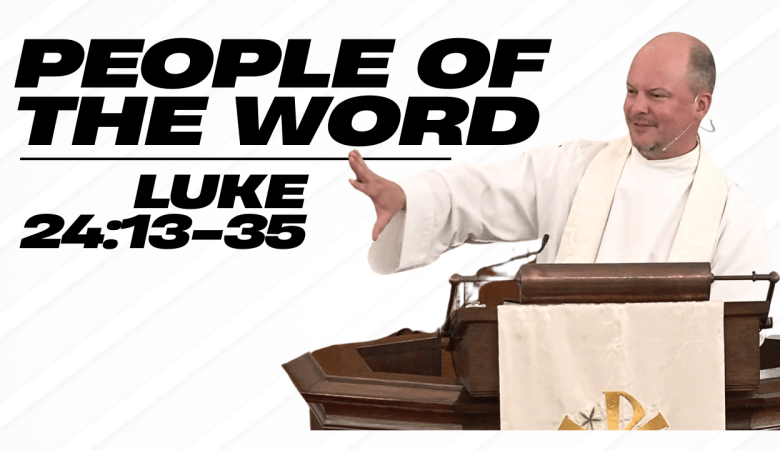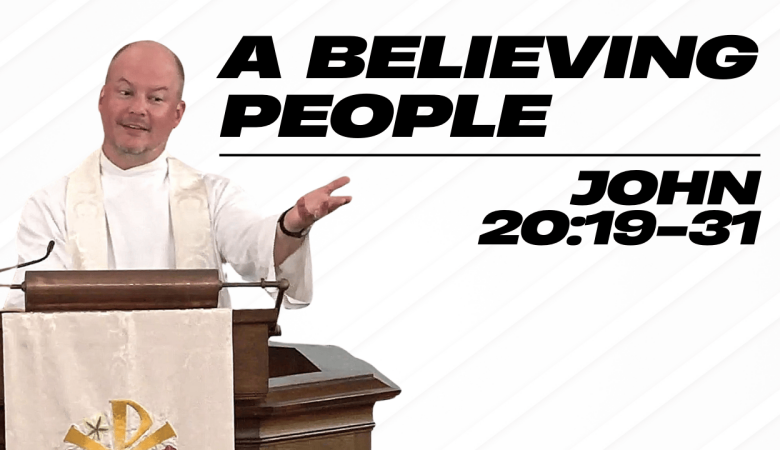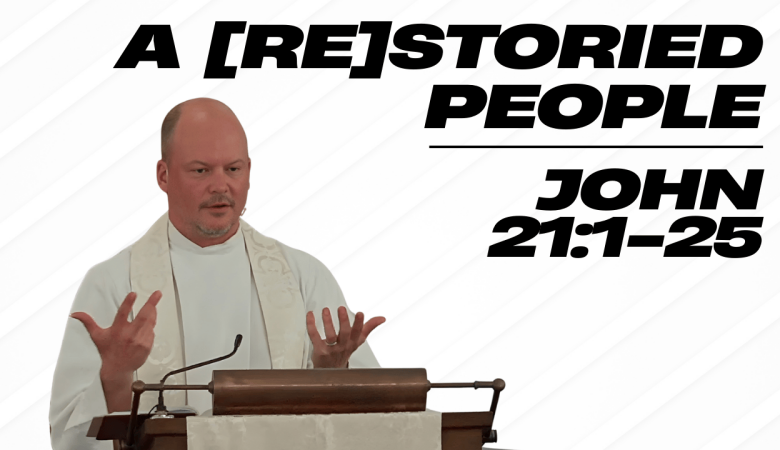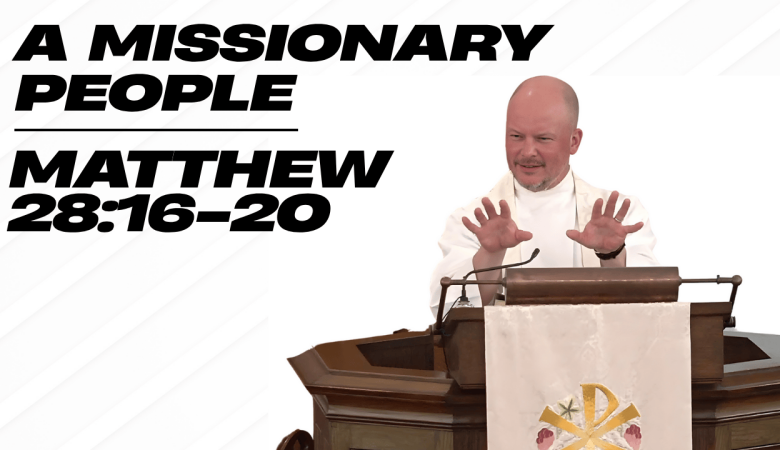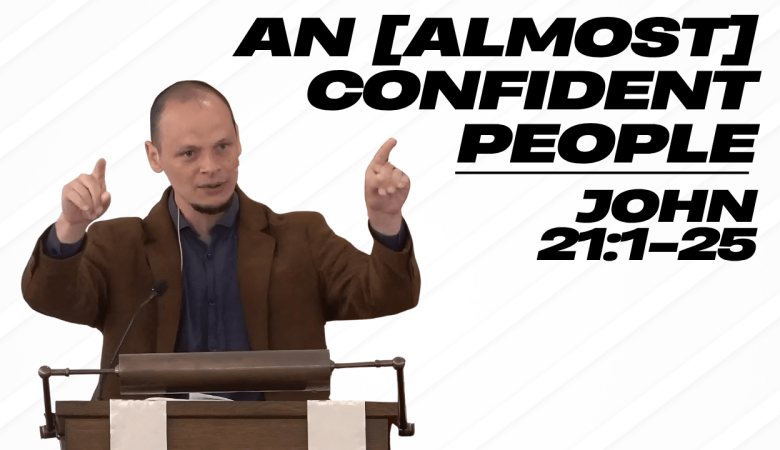Series: Resurrection Narratives
A Spirit-Led People
June 08, 2025 | Peter Rowan
Passage: Acts 1:4-11
Summary
In our eagerness to serve God, we often rush ahead without receiving what we need most—the Holy Spirit. After Jesus' resurrection, the disciples were ready to share the greatest story ever told, yet Jesus commanded them to wait in Jerusalem for the promise of the Father. Despite having engaged with the true story of our world, experienced Jesus bringing hope, had their doubts addressed, been restored after failures, and received the Great Commission, they needed something more essential than their enthusiasm.This waiting was necessary because the Holy Spirit is the active agent of mission. As Lesslie Newbigin noted, mission isn't something the church does but something done by the Spirit who changes both the world and the church. Without the Spirit, our efforts are merely human striving. Additionally, the fruits of the Spirit—love, joy, peace, patience, kindness, goodness, faithfulness, gentleness, and self-control—grow through waiting and abiding, not through rushing ahead. When the disciples obeyed and waited, Pentecost occurred, and they were transformed with divine power that enabled Peter to preach a sermon converting 3,000 people in one day. The early church was characterized by being 'filled with the Spirit,' which changed their economic life, care for others, and gave them confidence even in persecution.
Transcript
A Spirit-Led People
Opening Prayer
Lord God, we do thank you for today, Sunday, this resurrection day. Thank you for gathering us together or to worship you. We thank you for your word. We thank you for the promise of your Holy Spirit, who is with us. Jesus tells us, who guides us, who directs us. Spirit of God, please bless us now as we turn and consider you in this text before us. Hear us, we pray. Amen.
Introduction to Acts
All right, our text is going to be the New Testament passage. We've been in the Gospels. We're going to be in this New Testament passage of Acts, chapter one. Many of you know this, but Acts. I mentioned this actually in the education hour before service. But Acts is really the second part of the Luke Acts duo. Luke could be called the Acts of Jesus, and Acts could be called. Often it's called the Acts of the Apostles, but it could be called the Acts of the Holy Spirit. And it's kind of funny for us because we have them in our Bibles as Matthew, Mark, Luke, John, Acts. And John gets in the way. I don't know who did that. We should have been Matthew, Mark, John, Luke, Acts. So that, you know, Luke and Acts go together.
The Challenge of Preaching on the Holy Spirit
As you might imagine, when one is thinking of preaching about the role of the Holy Spirit, there is so much that could be said. There are many fine books on the work of the Holy Spirit. Actually, Bruce Weatherly, I just read his book that he is having published, and much of it is about the work of the Holy Spirit. And it sort of feels a little bit. I will say this, and this is often the case when you preach, but I would say this felt a little bit more this way this week. Overwhelming. There's just so much that could be done and studied and said and all this. It's sort of like when you start to clean your house on Saturday mornings with your kids, as I did yesterday, and you begin and you go, where do we stop? What do we focus on?
What Should the Church Do?
I want you to think for a moment of all the things that you might. That we might want to do as a church or maybe that we should do as a church. Just think about that for a moment. Okay. What should we do? What might be about as a church?
My guess is, even if I just gave you that short moment, you thought of things like preaching the gospel and caring for the poor, supporting local and foreign missions, the expanse of expansion of the good news of Jesus, maybe administering the sacraments, celebrating baptism and communion, maybe creating spaces where we can gather together and engage with God's word together, allow him to ask questions of us and to dig into the Bible together and do this as a body. Maybe you thought of things like evangelism, just simply we should be sharing the good news of Jesus with others. Maybe you think of raising our children and actually the truth is that even if we take these big categories and then we kind of break them down, we could spend all day long, I could break you up into groups, we could spend all day long just brainstorming what do we do as the church, how do we do it?
And the same thing could be said for us as individual Christians, right? What are the things that a Christian should be doing? And of course, you can think of things like loving God and loving our neighbor. And then we could just take that and we can just break it down. We could spend a long, long time about being peacemakers and those who seek justice and walk humbly with God. And then we could think of just the fruits of the Spirit and how there's to be present with us and be patient and kind and self controlled and all the rest. And when you start to kind of do that, there's this sense, I have this sense of just. It is a little overwhelming one. But then I also have this sense of let's get to it, let's go kind of eagerness, urgency. And of course we should be those who are eager to share the good news with others, eager to serve others, engage with the Word with others, train our children in the ways of the Lord. But it's really. There's just a lot. And I think that sometimes our impulse is just like, let's go, come on, come on, let's go.
Pentecost Context
We've said quite a bit. It's Pentecost Sunday. Pentecost Sunday is remembering the 50 days after Easter when the Holy Spirit came upon the people there waiting for him. We remember the descent of God, just as Israel, actually 50 days after they were saved out from slavery in Egypt, were with God there at Sinai. God descended there Sinai. Once you think about that they had been saved. They were to be brought into the promised lands. They were to be the blessing that God had promised Abraham to to them that they would be right. The blessing to the nations that you make them a great people and give them a land, and that through them all the nations of the earth will be blessed. And then he pauses them, pauses them for a little while at Sinai. And he descends on the mountain. Loud trumpets, clouds, smoke and fire, just as he did again in Acts 2. But I want you to think about that. So much was to be done. God bring in the kingdom, just bring us to the promised land. He pauses them. So much to do, to be the instrument of God's blessing in the world. Right.
The Text: Acts 1 and the Command to Wait
Our text this morning, acts, is Acts 1. And I chose this because we have been in this little series since Easter with these narratives of Jesus with his disciples after the resurrection. And we've been looking at how he interacts with them post resurrection. And as we've looked at these stories, what we've really been saying is, what does it mean for us? How does this shape us as a resurrected people? What does it mean to be the Church? In light of these narratives of Jesus with his disciples after the resurrection, how are we resurrected people?
And the first thing we read there in verse four, I skipped the first few verses because they're really just kind of ties in the book of Luke. But there in verse four, what we read, it says, and while staying with them, he ordered them not to depart from Jerusalem, but to wait for the promise of the Father. He says, wait, I've done this great work, but wait.
The Two Main Points
And I kind of want to take on this text and this morning this idea of the reality of the Spirit with these kind of two points. Okay? The first one is this, is that there is an understandable urgency, and then there is the sensual waiting. Okay? An understandable urgency and an understandable waiting.
First Point: An Understandable Urgency
So first, an understandable urgency. So he tells his disciples, don't depart, don't go. Why would he do that? Well, maybe, as I've kind of alluded to it, is kind of, you know, helping us to remember what God did when he brought his people out and he met with them there in Sinai. But why would he do that? Well, I can think of a lot of reasons why they might depart, why they might want to go. Okay?
First Reason: They Had Engaged with the Greatest Story
The first reason, if you hearken back with me to Easter Sunday, if you were here, is that they had actually engaged with the true fantasy, the thing that made the most sense of the world, the story of stories that resonated most with the way the world is, declared the world to be really good and deeply bad.
If you've been around for a little while, you have probably heard me say that one of the reasons why I am a Christian, which I think is just worth asking yourself occasionally, why I'm a Christian. One of the reasons why I'm a Christian is because the Christian story makes the most sense of the world. I don't know how you cannot look out in the world and say, this world is deeply lovely. Each person you meet is incredibly beautiful. And you have to hold that with this other Reality that things are not remotely how they are intended to be, that everyone has in them actually unbelievable darkness, too, that the world is so messed up and you have to hold these things together and you have to say, how do I make sense of this?
And these disciples had actually engaged with. With the thing that makes the most sense of this. God himself dying and yet doing so willingly for the good of the world. They had engaged with the greatest story of all. And if you hear a good story, do you tell that story? Of course you do. Let me tell you about the movie I just saw. Let me tell you about this book. Oh, man, my kid did something so funny. Of course you do. There's an urgency to say, I just engaged with the most amazing story ever. You need to hear it. So that would be the first reason why they're like, just a little bit, you know, unable to sit still.
Second Reason: They Had Been with the Lord
Second reason is that they had been with the Lord. And because they had been with the Lord, he had brought hope to their places of despair with His Word. He had met them in their despair and brought his words of hope. He had opened to them the scriptures, and they'd seen how he, in his suffering and in his resurrection was the whole point of it, the whole point of the scriptures that's found in Jesus. And he meets them in their place of despair and he brings them their hope.
They had witnessed the bread broken for them and been fed with the spiritual food that nourishes their languishing hearts. And the truth that God came for them, he died for them, he loved them while they were still enemies and strangers and far off and in their despair. And that meant that they had this real experience that the slog of life, the long kind of journey, slow journey, making their way back to Emmaus, if you will, with its many, many, many, many reasons to hang your head and to think about giving up and to live a hopeless life, was met by God with them in the flesh, which was to say that he knows our sorrow, he knows our despair. He's one who is acquainted with grief, Isaiah tells us, and yet he brings his hope, his resurrected presence into that.
And that, again, is something that you would want to run to others who have lost children, who have mental illness that plagues them, who were torn from their children or from their parents because of substance abuse and all kinds of other things. You would want to run into this world and say, I know how bad it is. The despair is real. And yet God brings His hope into this world. We worship a God who does not stand far off, away from it, but comes into it, conquers it, taking on death, conquering it. He was despised, he was rejected. He knows that this is the God we proclaim and he brings hope into that world. These disciples would have been antsy. Let's do something about this. Let's share this. Of course they need to be told not to depart.
It would have been like Joseph of Arimathea, right? Who had known the bad was bad, like the Mary's there at the empty tomb, who knew how satisfactory, sweet, not the sense that covered death were, but life after death is. They were like the two on the road to Emmaus, just like you and I have been on that road to Emmaus, who plodded along thinking all was lost, and yet we were brought the hope of resurrection. But there are other reasons. Let's keep going through them as we kind of rehearse this Eastertide.
Third Reason: Their Doubt Had Been Engaged Lovingly
Third reason they wanted to depart, no doubt, was that their doubt had been engaged with lovingly and they had grown in faith and belief. How lovely is the story of Thomas and Jesus. How lovely is it? Right? Jesus meets him in his doubt and he doesn't despise him because of it. He doesn't toss him off as though he weren't truly a disciple because he doubts, but he lovingly says, look, touch.
You remember just two weeks ago, we looked at the end of the Gospel of Matthew, the Great Commission. How even right there, before the words of the Great Commission, Matthew tells us, some doubted and they're still sent, they're still commissioned out into the world. And you and I can think today of how often almost any community that you exist in cannot stand, sort of the doubters who question the community narrative, right? I mean, you and I know how particularly technology has exacerbated this, how our feedback loops are just coming before us all the time, how much social destruction happens because of this, but also how quickly one is outside of the community if they simply doubt the narrative of that community.
And Jesus lovingly engages that doubt and he brings greater faith in the midst of that doubt. Jesus does long for our belief, just as he did the disciples in the storm that we heard earlier this spring. He invites us into a greater life of deeper faith and deeper belief. But he does not despise our doubt. And that would have been radical then and it's radical now. And they would have then said, we need to tell others about this kind of God who comes among us, who rises from the dead and yet even welcomes us in our doubt and commissions us out to the world. Okay.
Fourth Reason: They Had Been Restored
Another reason why they would have wanted to depart to go out is that they had been a restoring people because they had been restored by Jesus. And how much do we need the restoring work of Jesus? We live in a way, sort of a default way out of our failures and the ways that we've been sinned against. The default way that we engage with the world is out of our failures and the ways that others have failed us.
I know many of you have engaged on some level with the personality typing system, the Enneagram. Somebody once asked me recently, do you guys talk about that as a church? I was like, I try not to, but there's a lot of good there. And I think one of its strengths is that it names how this is true, how so often we live actually out of sort of coping with the reality of how we've been sinned against and how we are sinners. But why I say that is because we actually tell these stories primarily of how others have failed us and how we have failed others.
And Jesus actually invites us into naming that, but living a new story. Jesus with Peter right there on the beach, having just cooked the fish over the fire, restoring him as he restories us. We so often live in fear and scarcity and in shame. And what Jesus does in restoring us as he gives us new story where with the forgiveness of sins, where he gives us abundance, where he gives us love that covers our shame and our fear. Jesus, perfect love always casts out fear. And they would have wanted to share that. Okay, one last reason why they were urgent, why they had this urgency.
Fifth Reason: The Great Commission
And it would have been understandable Jesus had just told them this. All authority in heaven and earth and on earth has been given to me. Go therefore make disciples of all nations, baptizing them in the name of the Father and of the Son and of the Holy Spirit, to teaching them to observe all that I've commanded you. Behold, I'm with you always, even to the end of the age.
Jesus very likely had these two conversations. Acts, chapter one, Matthew 28, as one conversation. These are both narratives of the ascension which we would have celebrated last Sunday. I wasn't here with you to celebrate that, but these would have been part of the same conversation, right? Go, don't depart yet.
The Disciples' Question
Here's part of what I'm trying to say. There are so many things to do as the church. There are so many things to do as Christians, as the people of God sent out into the world, touched, changed by his word. Those who are growing in belief and faith and trust Those who have had our stories restoried by the resurrected Christ, those who have been sent these things that mark us as a resurrection people and lisk just go on. We all know this is true, of course.
This is partly why in verse six they say this verse six. So when they'd come together they asked him, lord, will you at this time restore the kingdom of Israel? Which is sort of like let's do it, let's go. It's not a wild question to ask. God acted definitively. The prophets of old had said then God would bring his people back from exile. Which we don't have time to get into how he does that in the second chapter. But it's a very reasonable thing to ask that. Let's get going. There's an understandable urgency in the disciples.
Second Point: Essential Waiting
But the second thing I want to say is this, that there is an essential waiting. Essential waiting.
So six again. So when they come together, they asked him, lord, will you at this time restore the kingdom to Israel? He said to them, it's not for you to know the time or seasons that the Father has fixed by his own authority, but you will receive power when the Holy Spirit has come upon you. And you will be my witnesses in Jerusalem and all Judea and Samaria to the ends of the earth.
Which is interesting. He doesn't really address their question necessarily. He says the Father knows. But he does address what is essential for the going out, for the doing.
Leslie Newbegin on Mission
Turn with me in your bulletins to the front cover. If you read these often, you will notice there's a couple names that come up a lot. And one of those is Leslie Newbegin, the great missionary to India and then to Great Britain in the 20th century. He says this mission going out of God's people, the work of God's people in the world. It's not simply the self propagation of the Church by putting forth the power that inheres in its life. To accept that picture would be to sanction an appalling distortion of mission. On the contrary, the active agent of mission is a power that rules, guides and goes before the church. The free, sovereign, living power of the Spirit. Spirit of God. Mission is not something that the church does. It's something that is done by the Spirit who is himself the witness, who changes both the world and the church, who always goes before the church in its missionary journey.
A.W. Tozer on the Holy Spirit
The truth is though, that we so often see the long list and continue the long list. Just go and do without being led. A.W. tozer writing in the middle of the last century. He Wrote, if the Holy Spirit withdraws from the church today, 95% of what we do would go on and nobody would know the difference. If the Holy Spirit had been withdrawn from the New Testament Church, 95% of what they did would stop and everybody would know the difference.
No Kingdom Without the Spirit
Jesus says, in a way, you want the kingdom. You want the reality of my reign. As you saw in my ministry here among you preaching of the kingdom. Lives transformed, the lame healed, the dead raised, new life brought to estranged folk, like the woman with the uncontrollable bleeding who'd been shunned from the community. Or the woman there at the well who had five husbands and the man she was living with wasn't her husband. How Jesus brought her and restored her to community. You want that kind of thing, the reality, the kingdom of God among you. But Holy Spirit, wait upon the Spirit.
There is no kingdom without the Spirit of God among us. There is no going out without the Spirit of God among us. There is no fruitful church without the Spirit of God among us. There's no fruitful Christian without the Spirit of God. There is no hope, there is no belief, there is no restoring, there is no mission. There's none of it without the Spirit of God. The Spirit must lead in all things.
What Is the Holy Spirit?
Now, I'm guessing some of you, because I've had this question posed to me a number of times, are thinking, what is the Holy Spirit? I think I kind of get the idea of God the Father. The Son is sent by the Father. He has certainness authority there. Get the idea of Jesus and the flesh, God with us. Hard to understand, but I think I can get my mind around a little bit. What about the Spirit?
Well, the first thing about the Spirit is it's a who. And the second thing is God. That's the big thing that Christians believe about the Holy Spirit. God with us, the gift of God's presence, the real presence of God with the people of God. The Spirit is the reality of God with us doing what we cannot do in and of ourselves.
Our Inclination to Do Things Ourselves
I think Luke concludes this whole bit about Jesus telling his disciples not to depart because he knows what we're inclined to do. Let's just go do it in and of ourselves. We've heard these things. Let's just go share them. We've got some good ideas. We want to do good things. Just go. We're inclined to do, even to do good things by ourselves. We're inclined to work and to strive and to accomplish. We are not inclined to yield, to wait, to be okay with the timing and the work. Maybe just the slow abiding of fruit bearing.
The Fruits of the Spirit in Urgent Doing
But think of this too. How often when we do these things in our own strength, in our own urgent timing, are the fruits of the Spirit evident in the doing? When we are eager to get something done? Is love often evident? How about peace? Is peace often evident in urgent doing? Is. I mean, this almost sounds silly. Is patience often evident in urgent doing or kindness or goodness or gentleness or faithfulness or self control? It's almost laughable to think about it. The fruits of the Spirit are so rarely evident when we just do do. But they are so often evident when we wait, when we abide, when we are patient. For God among us, when we sit with him and wait upon now, when we seek to do the work of the kingdom in our own time, in our own ways. The Spirit is strikingly absent. The fruits of the Spirit are strikingly bare.
There is, so I'm saying, there is an understandable urgency to the work that we are to do, that God calls us to do and to be as his body. But there is a necessary waiting. And if you don't do the waiting, you don't do the work.
What Happened When They Waited
But you know what happened when they waited. Some of you know what happened when they waited. Man. God showed up. God came, descended like he did long ago upon Mount Sinai and upon the temple, creating new temples in the church. His presence among his people. And that first Pentecost Peter preached, having been restored by Jesus, and 3,000 people responded. What must we do? What are we to do? They repent. And they were baptized and brought into the life of the. Of the church.
Disciples waited. The church moved out, filled with the Holy Spirit preaching. But then early on, actually what we learn is that their economic life was transformed, giving their lives. The word Spirit filled with the Spirit is all over the Book of Acts. You think of Stephen being filled with the Spirit. He was a deacon in the early church, preaching the Good News, and he was stoned. He had a confident think of Jed's sermon, almost confident people. He had a confidence, right, A belief that what God had done in Christ would be done for him. He could give of himself freely and fully because the Spirit of God, God himself was with him. They cared for their poor, they loved those who cursed them. They were filled with the Spirit and they gave themselves over to the life of the mission of God in the world.
Conclusion: The Promise of Pentecost
Friends, it is Pentecost this morning. And the promise of Pentecost is nothing less than the promise of Jesus. I am with you always. Let's Wait on the Lord. But then that. Then let's do the work of the church with that promise of Christ, with that reality of the Spirit. I am with you. Amen.
Closing Prayer
Lord God, we bless you. Holy Spirit, we adore you. God, we need you. God, I pray that for us who are so eager to just do. And we see the massive amount that there is. God, I pray that you would teach us to be those who abide in you and bear much fruit, to be those who wait upon you. And yet you show up, God, to be those who desire to be this resurrected community and are because you are with us in your Holy Spirit.
God. We think of how Pentecost is leading us into what the Church often calls as Trinity time or ordinary time or the growth time of the church. God, I pray that this reality of your revelation to us as Father, Son and Holy Spirit, God with us be the growth that we long for. That we would bear the fruit of love and joy and peace and patience and kindness and gentleness and faithfulness and self control. That you would bear much fruit through this body and through us as individuals.
God, have your way with us. Do what we cannot do in and of ourselves. Please, Lord, bear much fruit through the presence of your very spirit among us. Pray this the name of Jesus, the one who actually said, it's better that I leave. Let the Spirit come. Amen.
Series Information
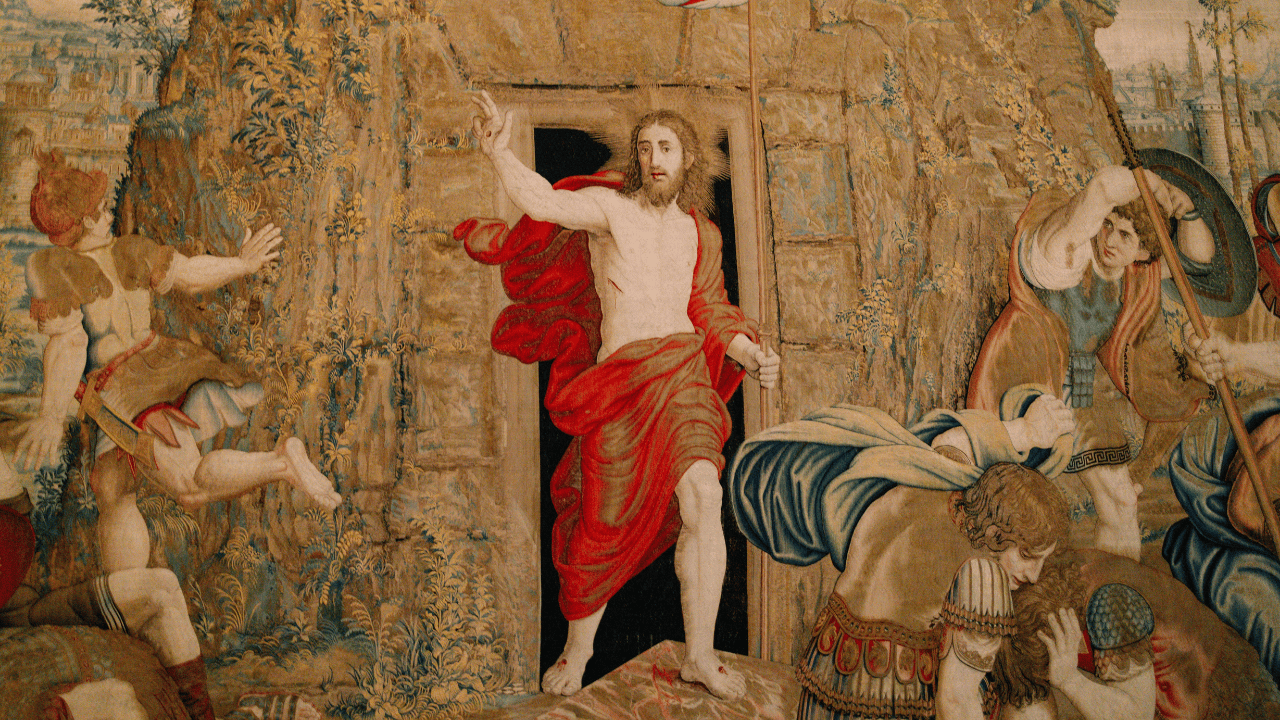
The resurrection is Christianity’s central claim. If it did not happen, as Paul recognizes, “ we are of all people most to be pitied.” Yet to Jesus biographers, Matthew, Mark, Luke and John, there was no doubting the reality of the resurrection. Each paints a different picture of its meaning. To Matthew, the resurrection is the cosmic vindication of Jesus claims of divinity and his place as messiah. Matthew takes aim at Jewish skeptics and rulers. Mark is concerned with the bewilderment and mystery of the empty tomb. Luke is concerned the Jesus connection to fulfilled Old Testament prophesy. John wants us to see the resurrected Lord’s compassion as he interacts with the nascent faith of his troubled disciples. The point of these narratives, and Paul’s commentary later, is that the resurrection is profound and its scope perhaps beyond our immediate comprehension.

